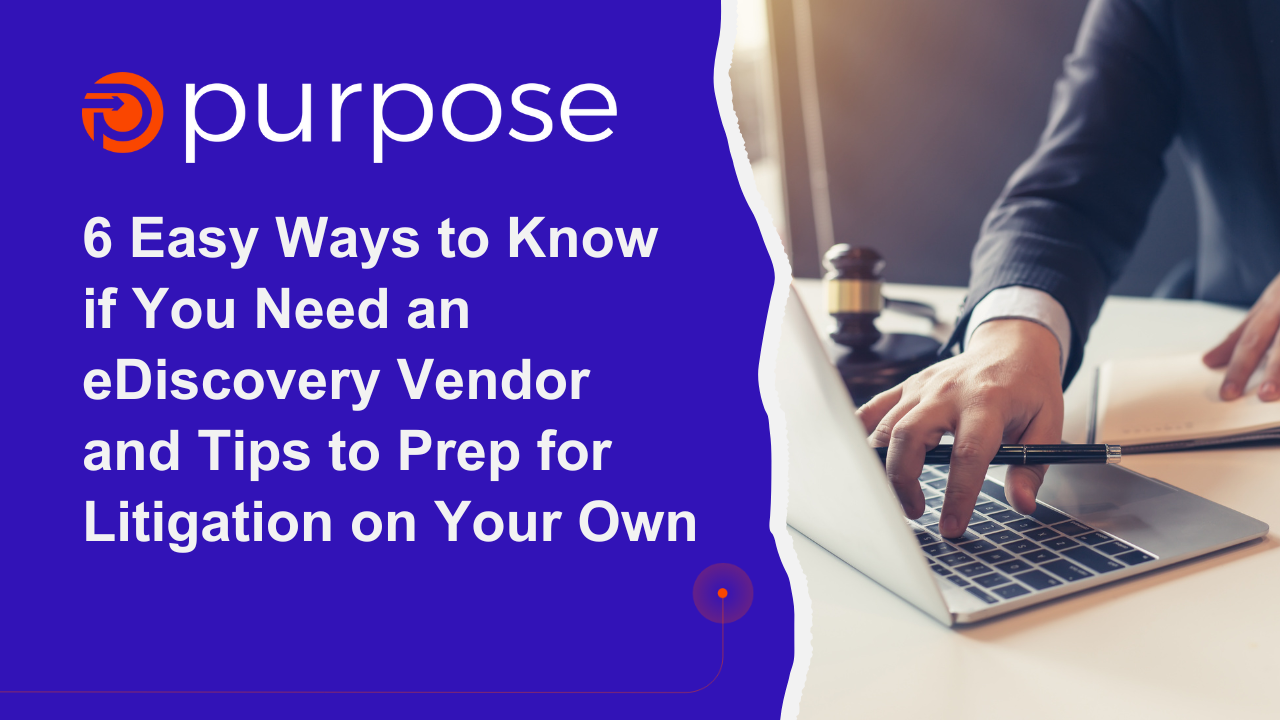6 Easy Ways to Know if You Need an eDiscovery Partner and Tips to Prep for Litigation on Your Own

Doug Kamiski, Chief Strategy Officer
With the rise of electronic communication, the sheer volume of data to be sifted through can be overwhelming. Working with an eDiscovery partner helps bring specialized services to your organization: organizing, searching, and analyzing electronic data. But how do you know if you need one? And if you’re not quite ready to hire a vendor, what can you do on your own to help provide ease during the litigation process? Here’s a guide purpose-built by our experts who are on the front lines of these types of projects day in and day out.
1. Recognizing the Volume of Your Data:
Indication: If you have terabytes of data or hundreds of thousands of emails and documents to sift through, it may be too much for a small team to handle.
DIY Tip: Begin by sorting data into categories: relevant, potentially relevant, and irrelevant. This initial sort can help you gauge the task at hand.
2. Variety of Data Sources:
Indication: If your data comes from multiple sources like emails, texts, social media, cloud storage, and more, the complexity increases.
DIY Tip: Create a list of all potential data sources. Regularly update and check this list to ensure you aren’t overlooking a crucial source. Include questions about data sources in custodial interviews.
3. In-house Expertise:
Indication: If your team lacks the expertise in handling eDiscovery tools or doesn’t understand the intricacies of digital forensics, seeking external help is wise. It is vital that your team is focused on the jobs they are most skilled at, instead of trying to tackle projects outside of their wheelhouse, potentially costing valuable time and money.
DIY Tip: Offer training for your staff on basic eDiscovery practices. Familiarize them with popular tools that can simplify data analysis. Take advantage of certification courses where it makes sense.
4. Legal Compliance and Standards:
Indication: eDiscovery requires adherence to legal standards to ensure defensibility. If you’re uncertain about them, or how to maintain them, it’s safer to consult an expert. Mishandling compliance requirements can end in costly fines or damage your reputation.
DIY Tip: Keep updated with the latest federal and state eDiscovery regulations. Regular audits can also help in ensuring compliance.
5. Time Constraints:
Indication: If you’re running against the clock, manually sifting through data isn’t practical. eDiscovery partners have the tools and expertise to expedite the process.
DIY Tip: Prioritize critical data sources. While it’s essential to be thorough, starting with the most relevant data sources can save time.
6. Budget:
Indication: Surprisingly, sometimes hiring an eDiscovery partner can be more cost-effective in the long run, especially if mistakes could lead to sanctions or retrials.
DIY Tip: Evaluate the cost-benefit of in-house eDiscovery. Factor in man-hours, tools, and potential risks, and compare it with vendor quotations. Consult an ROI calculator or consult with an expert to see what kind of cost savings you are leaving on the table.
Prepping for Litigation: Additional Easy DIY Tips
These tips can help you position yourself for better litigation practices. Additionally, if you end up working with an eDiscovery partner down the line, these will help you with onboarding and streamline the process.
- Early Case Assessment (ECA): Before diving deep into data, conduct an ECA. This will give you an overview of the case’s strengths and weaknesses and guide your eDiscovery efforts.
- Data Retention Policy: Implement a strict data retention policy. Knowing when and what to delete can save you from sifting through irrelevant data later.
- Collaboration: Regularly collaborate with your IT and legal teams. They can provide insights into data locations, relevance, and potential pitfalls.
- Documentation: Maintain a clear record of your eDiscovery process. This will not only help in maintaining compliance but also ensure that you can backtrack if required.
- Keyword Searches: Familiarize yourself with keyword searching techniques. Using the right keywords can drastically reduce the amount of data you need to review.
- Mock Reviews: Conduct mock reviews before the actual process. This will help in identifying potential challenges and streamline the process.
While the intricacies of eDiscovery can be daunting, recognizing when you need professional assistance and taking proactive steps can make the process smoother and more efficient. Remember, the key is to strike a balance between thoroughness and efficiency, whether you’re doing it in-house or with a valued partner.
If you need help navigating your processes, click here to schedule a no-obligation call with a Purpose Legal expert.


